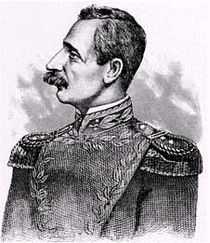Ezequiel Zamora

Ezequiel Zamora (Spanish pronunciation: [eθeˈkjel θaˈmoɾa]; 1 February 1817 - 10 January 1860) was a Venezuelan soldier and leader of the Federalists in the Federal War (Guerra Federal) of 1859-1863. His life was marked by the romanticism that characterized liberals of the time.
Zamora was born in Cúa, Miranda State. His parents were Alejandro Zamora and Paula Correa, modest landowners belonging to the white social class. During the early years of his childhood, he received basic education, typical of a rural area still disrupted by the struggles for independence from Spain.
Later, Zamora moved to Caracas, where he continued his primary school studies, the only formal education he received. However, thanks to the influence of his brother-in-law John Caspers, he received informal political training, influenced by the revolutionary movements in Europe. Zamora completed his education thanks to his friendly relationship with the lawyer José Manuel García. Zamora learned modern philosophy and the foundations of Roman law, and soon advocated the "principles of equality" and the need for their implementation in Venezuela.
After an aborted run for office as a member of the Liberal Party and amid claims of election irregularities, Zamora took up arms in 1846. He was captured 26 March 1847, and sentenced to death, but had his sentence commuted by President José Tadeo Monagas, who abolished the death penalty for political crimes.
In the Federalist War, Zamora was named the Federalist's "Chief Operating Officer of the West" on 22 February 1859. After leading successful battles in San Felipe, Yaracuy, (28 March 1859) and Santa Inés, La Ciénega, (10 December 1859) he died from a bullet to the head while preparing an attack on San Carlos, Cojedes.
Legacy
In 2001, a new land reform program under President Hugo Chávez, Mission Zamora, was named after Ezequiel Zamora.
References
- Biography at venezuelatuya.com (in Spanish)
External links
| Wikimedia Commons has media related to Ezequiel Zamora. |
|